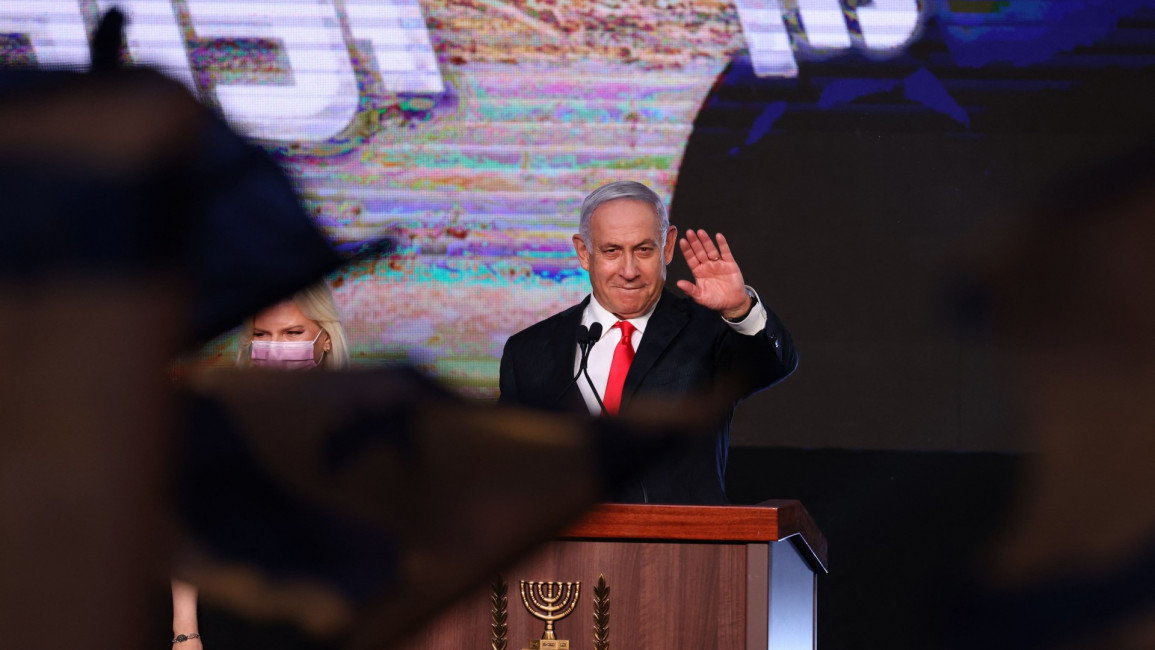Israel elections: Likud mulls options as Netanyahu fails to secure clear path to power
Israel elections: Likud mulls options as Netanyahu fails to secure clear path to power
Netanyahu's right-wing and religious bloc could turn to Israeli-Palestinian parties to secure the 61-seat majority needed to form government.
2 min read
Netanyahu has failed to secure a clear path to power [Getty]
Israeli Prime Minister Benjamin Netanyahu's Likud won more votes than any other party, but failed to secure a clear path to power, according to local media reports on Wednesday.
After around 90 percent of votes were tallied on Wednesday, Likud leads with around 30 seats, followed by the opposition Yair Lapid party with 17.
A majority of 61 seats in Israel's 120-member Knesset is needed for a coalition to form a government.
Netanyahu's right-wing bloc had hoped to see off an opposition coalition made up of left, right and centrist parties in what was is Israel's fourth election in almost two years.
The Arab List and the right-wing Yamina party, which have secured around six and seven seats respectively, are yet to declare support for a political bloc.
Exit polls on Tuesday night indicated that the pro-Netanyahu bloc had won 53 or 54 seats. The anti-Netanyahu bloc was on track to win 54 seats, the surveys showed.
Official ballot counting is expected to continue until Friday as some 450,000 ballots remain unopened.The results set Israel on course for further political wrangling and the prospect of a dreaded fifth election. Speaking to Channel 12 News on Wednesday, Likud MK Tzachi Hanegbi said Wednesday a coalition with the Joint Arab List was not off the cards.
"Our preference is a government made up of at least 61 Knesset members who support the central ideas of the nationalist camp. I hope this happens," Hanegbi said.
However, Hanegbi conceded that Likud would be considering "possibilities that are not desired at the moment, but are better than a fifth election, one of which is Mansour Abbas realising what he said for this entire campaign, that he would support any coalition that formulates a plan to deal with the issues in his sector".
"Whether or not it's accepted in the Arab community, we will work as we have worked to strengthen coexistence with the Arab public," Hanegbi added.


![Minnesota Tim Walz is working to court Muslim voters. [Getty]](/sites/default/files/styles/image_684x385/public/2169747529.jpeg?h=a5f2f23a&itok=b63Wif2V)




![Debris near Rafic Hariri International Airport [Getty]](/sites/default/files/styles/image_330x185/public/2176162423.jpeg?h=a5f2f23a&itok=MCSK9mkM)
![An Israeli air strike on Jabalia killed teenage journalist Hassan Hamad [Screengrab/X]](/sites/default/files/styles/image_330x185/public/2024-10/hassan%20hamad1.jpg?h=c12e0b96&itok=Rd_dyCVp)
